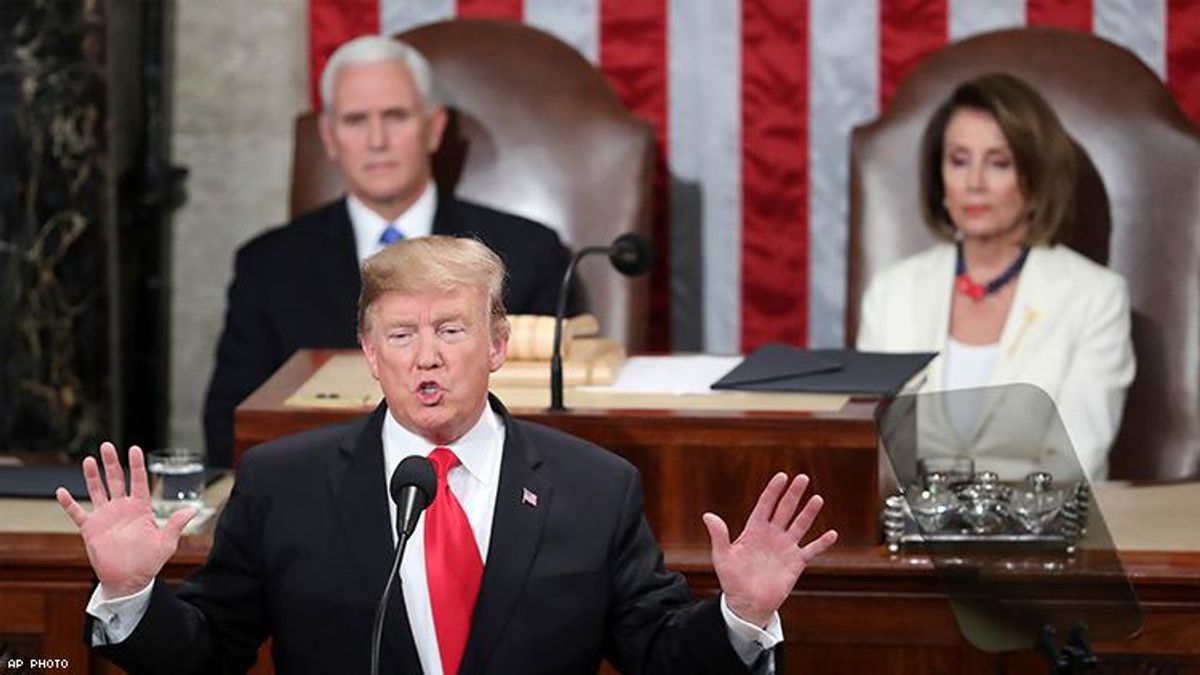President Donald Trump's State of the Union speech Tuesday night was marked by high-flying rhetoric about American greatness and unity - rhetoric that was at odds with many of his policies, while he also erased large swaths of the American people.
He praised the nation's military and veterans but never mentioned his plan to kick out thousands of service members simply because they are transgender. There were six trans military members in the audience as guests of Democratic members of Congress, including two invited by Speaker of the House Nancy Pelosi.
The expected announcement of an plan to end the HIV epidemic by 2030 consisted of a couple of vague lines that included the promise of increased spending. Specifics may come in the next few days, but it's worth noting that the Trump administration in the past has proposed cutting expenditures on HIV and AIDS, that the president has dismissed his entire advisory council on the issue, and that the administration supports health care providers who would deny care that violates their religious sensibilities. (Several LGBTQ groups have pointed out Trump's poor record on HIV and AIDS, as has the Democratic National Committee, which found the speech marked by empty promises on the issue.)
He applauded the record number of women in Congress - many of those attending the address wore white in honor of the women's suffrage movement - without acknowledging that most of them were elected in a backlash to his policies. He also did not mention the record number of LGBTQ people in Congress, nor did he even utter the term "LGBTQ" or anything similar.
 Women in Congress in suffragette white
Women in Congress in suffragette white
In a statement unlikely to win him any fans among women, except perhaps on the religious right, he asked Congress to ban late-term abortions. He condemned a recently enacted New York law, saying, "Lawmakers in New York cheered with delight upon the passage of legislation that would allow a baby to be ripped from the mother's womb moments before birth." The law does not do that, although it loosens some restrictions on late-term abortions. He also made the bizarre claim that Virginia Gov. Ralph Northam "stated he would execute a baby after birth," which is also not true, although Northam did give an awkward and confusing answer to questions about late-term abortions.
Trump further contrasted abortion with "the beautiful image of a mother holding her infant child," not remarking on the contrast between that image and the separation of immigrant children from their families because of his administration's policies.
He continued to claim that immigrants are bringing a crime wave into the U.S. through its southern border because of Congress's refusal to build the wall he wants, when in reality there is no such crime wave and that experts of immigration have said there are many better ways to keep criminals and illegal drugs from coming into the U.S. He stopped short of declaring a national emergency to allow him to build the wall, although a standoff between him and Congress could result in another government shutdown.
He also touted the booming economy, although the boom started well before he was president, and made some fact-challenged claims about strengthening the military, which was already quite strong before he took office (and in which, as of the last year of Barack Obama's presidency, trans service members didn't have to worry about being kicked out just because of who they are). He went on to assert that if he hadn't been elected president, the U.S. would now be at war with North Korea.
There was another strange statement that stood out. In calling for Republicans and Democrats to come together to address the nation's problems, Trump said that progress cannot be made amid "ridiculous partisan investigations." That was an obvious reference to Special Counsel Robert Mueller's investigation of Russian meddling in the 2016 presidential election, and possible collusion by the Trump campaign.
The president did not touch on issues of gun control, despite mass shootings in the past year, or of voter suppression. But Stacey Abrams, the Democratic gubernatorial candidate in Georgia last year, did mention these things in her response to Trump's address. The nation has acted "timidly" on gun safety legislation, she said, while politicians have described calls for every vote to be counted as a "power grab." (The Georgia gubernatorial election was marked by accusations of the suppression of Democratic votes, but Abrams said she accepts the results of the election, which she lost.)
Abrams, unlike Trump, also gave a shout-out to LGBTQ people. Talking about civil rights and the need to combat racism and other types of bigotry, she said, "We affirmed marriage equality, and yet the LGBTQ community remains under attack."
She addressed another issue the president didn't bring up, the government shutdown, which caused some federal workers, lacking paychecks, to go to food banks. "Just a few weeks ago, I joined volunteers to distribute meals to furloughed federal workers," she said. "They waited in line for a box of food and a sliver of hope since they hadn't received a paycheck in weeks."
She added, "The shutdown was a stunt engineered by the president of the United States, one that defied every tenet of fairness and abandoned not just our people -- but our values."
Abrams's speech, which included support for workers, reproductive rights, and quality education for all, was far shorter than Trump's but also far more inclusive. His mention of education was limited to a call for "school choice," usually meaning vouchers for private schools, which undermines public schools.
Abrams called on the president to "respect the diversity that defines America" and make a "renewed commitment to social and economic justice." She concluded, "When we do so, never wavering, the state of our union will always be strong."


 Women in Congress in suffragette white
Women in Congress in suffragette white














































































